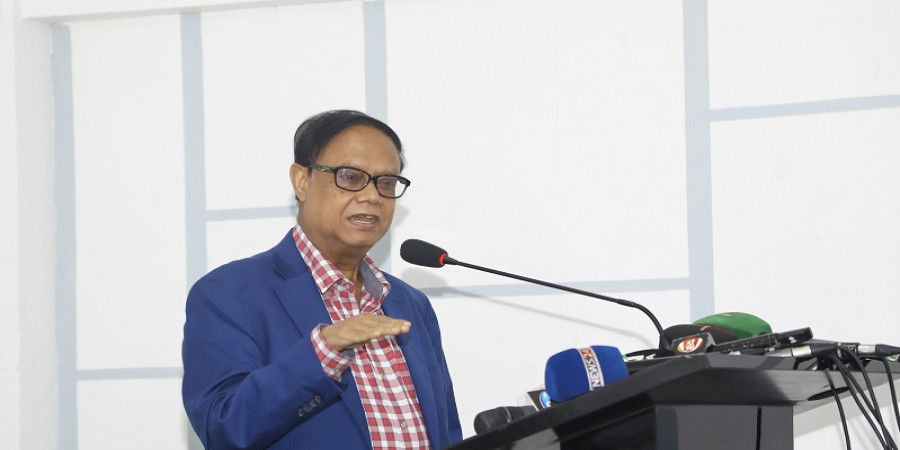
ছবি: File photo
The Governor of Bangladesh Bank, Ahsan H. Mansur, has set a goal of reducing inflation to 7% by June 2024, with a further target of bringing it down to 5% by the middle of the next fiscal year. He emphasized the primary goal of stabilizing inflation at a range of 4-5%, which he believes is achievable despite current economic challenges.
Speaking at a seminar held on December 4, 2024, at the Bangladesh Institute of Bank Management (BIBM) auditorium, the governor discussed the ongoing inflationary pressures and the steps needed to address them. The seminar, titled "Tipping Points of Reform Agenda for the Turnaround of the Banking Sector of Bangladesh," was organized by BIBM to discuss reforms and improvements in the banking sector.
Inflation and Economic Challenges
Governor Mansur attributed the rise in inflation to the recent floods, which have caused an increase in the prices of vegetables and food items. He expressed confidence that once the impact of the floods subsides, prices would stabilize and inflation would begin to decrease.
He further explained that reducing inflation to 7% would enable the Bangladesh Bank to lower interest rates and policy rates, which would, in turn, boost economic activity. “Once we achieve inflation of 7%, we can reduce the interest rates and policy rates,” he said, adding that this would help stimulate both the banking and broader economic sectors.
Long-term Economic Vision and Challenges
The Governor also discussed the broader economic challenges facing Bangladesh, noting that key sectors such as banking, stock markets, insurance, and the bond market have remained weak for the past 10-12 years. He highlighted the fact that the bond market has yet to be developed, and both the insurance and stock markets are in poor shape, forcing the country to rely heavily on the banking sector for economic growth.
“Unless we can find long-term sources of funding, we will remain overly reliant on the banking sector,” said Mansur, stressing the need for diversification and strengthening other economic pillars to reduce dependence on banks.
He also pointed to the issue of liquidity in the country, mentioning that Bangladesh’s foreign exchange reserves, which once stood at $48 billion, have now dwindled to $24 billion. “The remaining funds have left the country,” he noted, emphasizing the need to address the capital flight issue to stabilize the economy.
Measures to Combat Capital Flight
To address the challenges facing the banking sector and the economy, Governor Mansur stressed the importance of increasing domestic deposits. He warned that if the country could not attract more deposits, the outflow of money would continue, which would hinder growth in both the banking and broader economic sectors.
He also discussed the importance of curbing money laundering and capital flight. “We must stop the outflow of money from the country to secure our banking and economic growth,” Mansur said. He underlined the urgency of implementing reforms to ensure that the country’s financial resources remain within its borders to support sustainable growth.
Additional Remarks by Senior Officials
The seminar also featured speeches from Deputy Governors of Bangladesh Bank, Mohammad Habibur Rahman and Noorun Nahar. They shared their insights on the banking sector’s current challenges and the reforms needed to stabilize and strengthen the sector. They echoed the governor’s concerns about the country’s heavy reliance on the banking system and the urgent need for broader economic reforms.
The discussions at the seminar focused on addressing long-standing weaknesses in Bangladesh’s financial sector and finding practical solutions to ensure more stable and inclusive growth in the future. The Governor emphasized the need for a comprehensive reform agenda to restructure the banking sector, strengthen regulatory frameworks, and diversify financial markets to reduce dependence on banks.
Outlook and Future Steps
As inflation continues to impact the daily lives of citizens, the Bangladesh Bank is focusing on measures to stabilize the economy and reduce inflation. With a clear plan to lower inflation to 7% by mid-2024 and to 5% within the next fiscal year, the Bank is committed to pursuing reforms that will help stabilize the financial system and promote long-term economic growth.
While challenges remain, Governor Mansur’s outlook reflects cautious optimism, focusing on achievable targets and the importance of comprehensive economic reforms to ensure a sustainable and resilient economy. The central bank's focus on reducing inflation and strengthening the banking sector is seen as a critical step in supporting the country’s economic stability and development.
repoter






